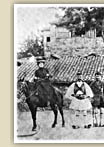|
 who,
during the course of negotiations for the handing over of these areas to Greece
in the late 1870s, landowners sold their properties to Greek
capitalists. who,
during the course of negotiations for the handing over of these areas to Greece
in the late 1870s, landowners sold their properties to Greek
capitalists.
The former Turkish chiftliks, as these large estates were called, were the organizational remnants of the late Ottoman Empire period and were related
to its decline. However, the farmers, the sharecroppers ,
had the right to be financed on very favourable terms and would not be forced out
of the land they cultivated. Such traditional landholding patterns were abolished
when the lands were transferred to the Greek state and modern law established, which recognized only the relations of owner-tenant between the large estate owner
and the sharecropper with no rights whatsoever to the latter.
Until the 1880s the Greek governments in general did not promote large landowning, as witnessed by the agricultural reforms of 1871. However, Harilaos
Trikoupis, who wished to the attract Greek capitalists from abroad, accepted
the established state in Thessaly and implemented a series of economic measures
such as taxation on 'work animals' or the protectionist policy
for grain, which favoured particularly the large estate owners. His major objective,
apart from hoping to minimize discontent among big landowners, was the development
of wheat production so as to ensure the country's self-sufficiency in wheat,
given that natural conditions and the estate patterns in Thessaly
allowed for extensive production of grain.
However, the large landowners took advantage of the protectionist policy of the state
that forbade the import of wheat and by limiting their production secured high prices without bringing about self-sufficiency.
Uncultivated land was rented out to stock breeders as winter quarters.
|
 |

Thus, the price of bread in the cities was very high, a fact that resulted
in discontent among popular and petit bourgeois classes of the city, who supported the
agricultural movement that developed in Thessaly in the beginning of the
twentieth century.
At the same time, the state of farmers in the large estates was hopeless.
Taxation hit them hard, while they were subject to the will of the
large estate owners, who reserved their right not to renew their contracts. In addition,
their plight was exacerbated by the fact that loans were contracted on unfavourable terms. In the 1900s
the state was not able to pass laws for expropriations and distribution of land. The landless
Thessalian farmers began to struggle for a fair distribution of land despite
the terrorism of the large estate owners. This led to the assassination of Marinos Antypas, one
of their leaders in 1907.
The need for a favourable sharecropper policy, however, became apparent
and constituted part of the reform programme that followed Goudi's coup
in 1909. The mobilizations of farmers continued and resulted in the bloody suppression of the
riots in Kileler in 1910. Venizelos, as part of his recovery policy, promoted agricultural
changes both with the revision of the 1911 constitution,
when the right of the state to expropriate and offer compensations
for the common benefit of citizens was consolidated, and chiefly with the agricultural reforms
of 1917.
|
 |
